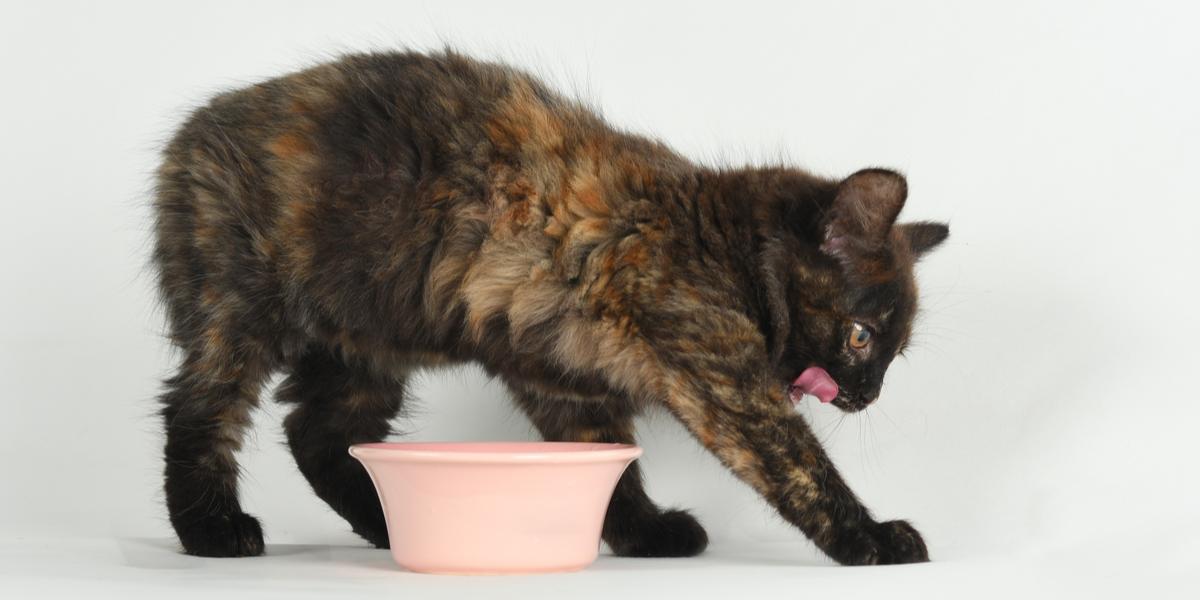Have you ever observed your feline friend scratching the floor after a meal and wondered what it signifies? If so, you’re not alone! Cats are fascinating creatures with a rich tapestry of behaviors that can sometimes leave their human companions scratching their heads. While it might seem perplexing at first, this post-meal scratching is one of many endearing antics that can shed light on your cat’s instincts and emotions.
In this article, we’ll explore the reasons behind this quirky behavior, unveil the secrets of feline body language, and help you understand what your furry companion might be trying to communicate. So, grab your favorite cup of tea, settle in, and let’s delve into the captivating world of cat behaviors!
Table of Contents
- Understanding Your Cats Post-Meal Behavior
- The Significance of Scratching in Feline Communication
- Addressing Scratching Habits: Tips for a Peaceful Home
- When to Consult a Vet: Recognizing Behavioral Changes
- Q&A
- Final Thoughts
Understanding Your Cats Post-Meal Behavior
After your cat has enjoyed a delicious meal, you might notice some peculiar behaviors, such as scratching at the floor or around their feeding area. While this action may seem odd, it’s part of their instinctive habits inherited from their wild ancestors. Cats are natural hunters, and after a successful hunt, they often cover their tracks to avoid detection by predators. Scratching the floor can be their way of mimicking this instinct, signaling a sense of satisfaction after a good meal while also providing a little workout for their claws.
Additionally, this post-meal behavior can also be a form of territorial marking. Cats possess scent glands in their paws, and as they scratch the surface, they may be leaving their unique scent to assert ownership over the area. Here are some other common post-meal behaviors you might observe:
- Grooming: A way for cats to relax and clean themselves after eating.
- Resting: Many cats will seek a cozy spot to nap once they’ve eaten, conserving energy for their next playful endeavor.
- Purring: A sign of contentment, indicating they are happy with their meal.
The Significance of Scratching in Feline Communication
Scratching is an intrinsic part of a cat’s communication repertoire, serving multiple purposes that go beyond mere physical maintenance of their claws. When your feline companion scratches the floor after a meal, it can indicate a variety of sentiments, such as satisfaction, territorial marking, or an instinctual behavior dating back to their wild ancestors. Cats possess scent glands in their paws, and scratching can be a way for them to leave their mark in what they perceive as their territory, reinforcing their claim over the space around them. This instinctual behavior may also be a way to express contentment or relaxation, akin to a cat kneading after a hearty meal.
Moreover, the act of scratching can also be linked to behavioral health and emotional well-being. It serves as a form of self-soothing, akin to how humans might stretch after a meal. The rhythmic motion of scratching can help cats release pent-up energy while facilitating their overall physical health. Understanding this aspect of feline behavior can enhance the bond between you and your pet, enabling you to respond empathetically to their needs. Here are some key points to keep in mind regarding scratching behavior:
- Territorial Expression: Marking their territory with scent.
- Relaxation Technique: A form of self-soothing after eating.
- Energy Release: Expelling excess energy through physical activity.
- Instinctual Behavior: Rooted in evolutionary survival strategies.
Addressing Scratching Habits: Tips for a Peaceful Home
Understanding why your cat scratches the floor after meals can help you manage this behavior effectively. This instinctive action may stem from various reasons, including territory marking, expressing satisfaction, or simply a leftover remnant of their wild ancestry. To mitigate excessive floor scratching that disrupts your home, consider implementing a few proactive strategies:
- Provide Scratching Posts: Invest in high-quality scratching posts or pads placed nearby their feeding area. Encourage your cat to use these alternatives by rewarding them with treats.
- Designate a Feeding Area: Create a specific space for meals, complete with comfortable mats that discourage floor scratching.
- Interactive Feeders: Use puzzle feeders or slow feeders that engage your cat, occupying their focus and reducing the likelihood of scratching afterward.
Additionally, reinforcing positive behaviors can go a long way. When your cat uses their designated scratching post instead of the floor, shower them with affection and praise. You might also want to consider the following adjustments to their environment:
| Adjustment | Benefit |
|---|---|
| Catnip-Infused Scratching Posts | Attracts cats to intended surfaces |
| Regular Playtime | Redirects energy, reducing anxiety |
| Soft Flooring Options | Reduces noise from scratching |
When to Consult a Vet: Recognizing Behavioral Changes
Recognizing when to seek veterinary advice can be crucial for your cat’s well-being, especially when you notice unusual behaviors after mealtime. If your feline friend starts scratching the floor or displaying other behavioral changes, consider the following signs that may warrant a visit to the vet:
- Over-Grooming: If your cat excessively grooms itself in response to stress or discomfort, this could indicate an underlying health issue.
- Changes in Appetite: A sudden increase or decrease in food intake may suggest gastrointestinal problems or dental pain.
- Increased Aggression: Unexpected hostility towards family members or other pets can signal anxiety or physical pain.
- Frequent Vocalization: If your cat is meowing more than usual, it may be expressing discomfort or distress.
Monitor your cat’s behavior closely and maintain a record of any changes you observe. It can be helpful to provide your veterinarian with specific information, such as the duration of the behavior and any accompanying symptoms. You might consider using a simple table to track instances of unusual behaviors:
| Date | Behavior Observed | Duration | Notes |
|---|---|---|---|
| 10/01 | Scratching floor after meals | 10 minutes | Sudden change noted |
| 10/02 | Increased hiding | All day | Seems more anxious |
Q&A
Q&A: What It Means When Your Cat Scratches The Floor After A Meal
Q1: Why does my cat scratch the floor after eating?
A1: When your cat scratches the floor after a meal, it’s likely expressing a mix of instinctual behaviors. Cats are natural hunters, and scratching can be an instinctive action to help “cover up” their food, much like they would in the wild to hide their leftovers from potential scavengers. It can also be a way for them to mark their territory, as they have scent glands in their paws.
Q2: Is this behavior normal for all cats?
A2: Yes, scratching the floor after eating is a common behavior observed in many cats. However, individual personalities vary—some cats may scratch more than others, or they might express their instincts in different ways, such as kneading or purring.
Q3: Should I be concerned if my cat scratches obsessively?
A3: While scratching is a normal behavior, if it becomes obsessive or is accompanied by signs of distress or aggression, it might be worth consulting your veterinarian. Stress or anxiety in cats can manifest through repetitive actions, so it’s essential to monitor any other behaviors they may exhibit.
Q4: How can I help reduce unwanted scratching behavior?
A4: Providing your cat with appropriate scratching surfaces can help channel their instincts. Consider placing scratching posts or pads in areas they frequently scratch. Additionally, giving your cat enough playtime and mental stimulation can keep them engaged and reduce excessive scratching.
Q5: Does the surface they scratch matter?
A5: Yes! Cats have preferences for certain textures and surfaces. Many cats enjoy scratching softer surfaces like carpets or rugs, while others prefer harder ones like wood or concrete. Observing your cat’s preferences can help you provide suitable alternatives.
Q6: Are there any additional benefits to scratching?
A6: Absolutely! Scratching helps cats maintain their claws, keeping them healthy and sharp. It also provides a form of exercise, helping them stretch their bodies and relieve stress. Plus, marking their territory through scratching can make them feel more secure in their environment.
Q7: Can I train my cat to stop this behavior?
A7: Training a cat to stop natural behaviors can be challenging, but you can redirect their scratching. When you notice your cat scratching the floor, gently redirect them to an appropriate scratching post or toy. Reward them for using these alternatives to reinforce the behavior you want to see.
Q8: Should I worry about my cat’s health if they scratch after eating?
A8: Generally, scratching after meals is a harmless behavior and not a health concern. However, if you notice changes in your cat’s appetite, energy levels, or if they exhibit signs of discomfort (like vomiting or refusing to eat), it’s always a good idea to consult your veterinarian to rule out any health issues.
Q9: What else can I do to understand my cat’s behavior?
A9: Observing your cat’s overall behavior and routine can provide valuable insights. Keep an eye on their body language and vocalizations to better understand their moods and needs. Engaging with your cat through play and providing a variety of toys can also help you discover what they enjoy and how they express themselves.
Q10: Can I learn more about cat behaviors?
A10: Absolutely! There are many resources available, including books, websites, and even local workshops about feline behavior. You can also consult with a veterinarian or a feline behaviorist for more personalized advice. Understanding your cat’s behaviors can enhance your bond and improve their quality of life!
Final Thoughts
observing your cat’s quirky behaviors can provide valuable insights into their instincts and emotions. When your feline friend scratches the floor after a meal, it’s not just an odd habit; it’s a manifestation of their natural instincts, a way to communicate comfort, or even a sign of territoriality. Understanding these behaviors can enhance your bond with your pet and help you provide a nurturing environment that caters to their needs. So next time you see those little paws at work, you can appreciate the deeper meaning behind the action. Remember, every scratch is a part of what makes your cat uniquely them! Keep exploring and enjoying the fascinating world of feline behavior, and cherish the moments shared with your furry companion.
















